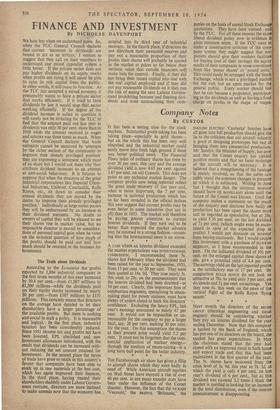FINANCE AND INVESTMENT
By NICHOLAS
DAVENPORT
WE hate less when we understand more. So, when the TUC General Council declares that current 'increases in dividends are bound to act as an irritant,' I venture to suggest that they call on their members to understand our mixed capitalist system a little better. If the private sector does not pay higher dividends on its equity stocks when profits are rising it will never be able to raise its risk capital from the public: in other words, it will cease to function. As the TUC has accepted a mixed economy it presumably wants to have a private sector that works efficiently. If it tried to limit dividends by law it would stop that sector working efficiently. If the degree of the dividend increase is called in question it will surely not be irritating for the TUC to find that the amount paid out last year in dividends was only 50 per cent. more than in 1938 while the amount received in wages and salaries was three times as much. When the General Council declares that trade uniouists cannot be unmoved by `attempts by the richer section of the community to improve their already privileged position' they are expressing a sentiment which most of us share but I would ask them why they attribute dividend increases to an attempt at anti-social behaviour. It is fatuous to suppose that when the directors of the great Industrial corporations like Imperial Chem- ical Industries, Unilever, Courtaulds, Rolls Royce, etc., sit down to consider their annual dividends they are moved by the desire 'to improve their already privileged position.' Individually as large surtax payers they will be embarrassed by an increase in their dividend warrants. No doubt as owners of capital they will be pleased to see their shares rise in market value, but no responsible director is moved by considera- tions of personal capital gain when he votes on the technical question of how much of the profits should be paid out and how much should be retained in the business for Investment.
The Truth about Dividends
According to the Economist the profits reported by 1,884 industrial companies in the first seven months of this year increased by 10.4 per cent.—from £1,087 millions to £1,200 millions—while the dividends paid on their equity stocks increased by nearly 30 per cent.—from £107 millions to £131 millions. This certainly means that directors on the average have decided to let their shareholders have a larger percentage of the available profits. But there is nothing anti-social in such a policy. It is reasonable and logical. In the first place, industrial taxation has been considerably reduced. Since 1951 income tax and profits tax have been lowered, EPL abolished and new investment allowances introduced, with the result that dividends can be increased with- Out reducing the net amount retained for investment. In the second place the terms of trade have gone so much in this country's favour that companies have been able to stock up in raw materials at far less cost, which has again improved their finances. In the third place, having treated their shareholders shabbily under Labour Govern- ment restraint, directors are more inclined to make amends now that the economy has entered into its third year of industrial recovery. In the fourth place, if directors do not distribute their unwanted reserves and pay out a reasonable proportion of their. profits their shares will probably be quoted in the market at prices so far below their intrinsic value that outside financiers will make bids for control. Finally, if they did not bring their issued capital into line with the real capital employed and if they did not pay reasonable dividends on it they run the risk of seeing the next Labour Govern- ment prohibiting bonuses and freezing divi- dends and even nationalising their coin- panics on the basis of unreal Stock Exchani quotations. They have been warned—an by the TUC. For all these reasons the moi liberal dividend policy now in evidence plain common sense. If the TUC want I make a constructive criticism of the con pany system they might suggest that en ployers should give their workers facilitil for buying (out of their savings) the equit stocks of their companies in some convenici form like `penny shares' or 'pound unitf. This could easily be arranged with the Stoc Exchange, which is not a privileged mark, for the rich but an open market for tl general public. Every worker should fe that he can become a proprietor, participa ing in the dividends as well as having a fix( charge on profits in the shape of wage


































 Previous page
Previous page